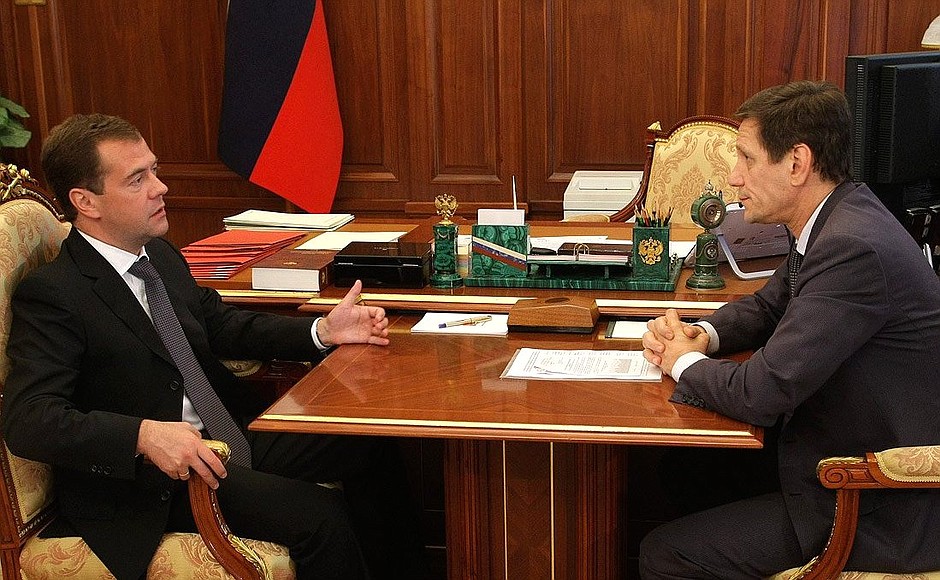
* * *
President of Russia Dmitry Medvedev: Mr Zhukov, in addition to the fires that are currently causing many problems, we also have other challenges that should not be forgotten. Life goes on, despite these natural disasters.
Unfortunately, one of the problems we have been dealing with for a long time is unemployment, which has grown sharply since the beginning of the global financial crisis. The Cabinet regularly reports on the developments in this area. What is the current state of employment in our nation?
Deputy Prime Minister Alexander Zhukov: Mr President, it is true that we are regularly monitoring unemployment rates and the situation on the job market. I must say that in the last six months, the situation has improved significantly.
The latest Rosstat [Federal State Statistics Service] data for unemployment in Russia shows that in June, we had a total of 5.2 million unemployed individuals.
Dmitry Medvedev: What percent is that?
Alexander Zhukov: It’s 6.8 percent.
Dmitry Medvedev: Those are the figures for July?
Alexander Zhukov: That’s through July, for the first half of the year. For comparison, at the beginning of the year, we had 6.8 million jobless individuals. In other words, we had 1.4 million more people who were unemployed.
Dmitry Medvedev: That is quite significant. Wasn’t it higher than eight percent, if I remember correctly?
Alexander Zhukov: It was 9.2 percent, so it’s gone from 9.2 to 6.8 percent. So, the decrease is quite significant. This is the total number of unemployed individuals. Every week, we are updating our records on the number of registered unemployed individuals; naturally, this figure is much lower than the overall number of unemployed in the country.
During the most recent week of observation, between July 21 and 28 of this year, the number of unemployed individuals registered with employment agencies has decreased by 18.5 thousand and is currently at 1.806 million people. As you may recall, this figure was at 2.3 million at its highest, at the beginning of the year. In other words, it has decreased by almost half a million. We are seeing a decline in unemployment in just about every region of the Russian Federation; this week, it has fallen in 74 federal constituent entities.
There is one more positive fact. Last year, we saw massive layoffs (especially during the crisis), but we also saw many workers forced to take a mandatory leave or work part-time – a kind of hidden unemployment. This figure reached 1.5 million individuals, or even more.
Now – this is also during the last week – we see that this number is continuing to go down; it has decreased by over 18 thousand. The overall number of workers like this, who are not working due to administrative causes or who are working only part-time, currently stands at 716 thousand.
Dmitry Medvedev: Clearly, the figures are fairly positive. Nevertheless, do you feel that this is a long-term trend, or is seasonal employment a factor, since it always grows during the summer due to obvious reasons like construction, harvesting and such?
Alexander Zhukov: You are absolutely right, the seasonal aspect is always a factor. Employment grows in summertime and decreases toward the end of the year, in the winter. But of course this cannot be explained by these reasons alone. Clearly, we are seeing and observing a general improvement in industrial production.
Since the beginning of the year, we have seen growth in manufacturing and the creation of new jobs. We see that jobs are being created quite actively in small and medium-sized businesses. The crisis-related developments that we were observing earlier are now being overcome.
I think that an important reason for this is the implementation of employment programmes. The regional programmes that were developed were operating at the end of 2009 and are being actively implemented today. They allow new jobs to be created.
Thanks to these programmes, 150 thousand jobs were created last year in small and medium-sized businesses alone. This year, this process continues. Under these programmes, we specifically focused on creating jobs in small and medium-sized businesses and decreased temporary jobs, which I generally see as a structurally correct move.
Dmitry Medvedev: Yes, I think that these programmes, which we had to create for, shall we say, unpleasant reasons – the beginning of the crisis – generally turned out to be fairly successful. And it is absolutely right to focus now specifically on creating jobs in small and medium-sized businesses, because that is our strategic direction in general. Regardless of how the crisis is going, we must increase the share and the role of small businesses in Russia’s economy.
Thus, we need to keep working on it in the future.
Alexander Zhukov: We are currently discussing approaches to the budget for 2011 and subsequent years; overall, we have decided to wrap up many of the temporary anti-crisis measures, given that the most acute phase of the crisis has passed and we are seeing some improvement. Still, we have decided to maintain regional programmes through 2011, perhaps on a smaller scale, but with a specific focus on supporting small and medium-sized businesses. And overall, the programmes being carried out by the Ministry of Economic Development to provide grants, loans, and preferential terms for small and medium-sized businesses must deliver results, including in terms of employment.
Dmitry Medvedev: Very well. Let’s continue these programmes.
<…>
